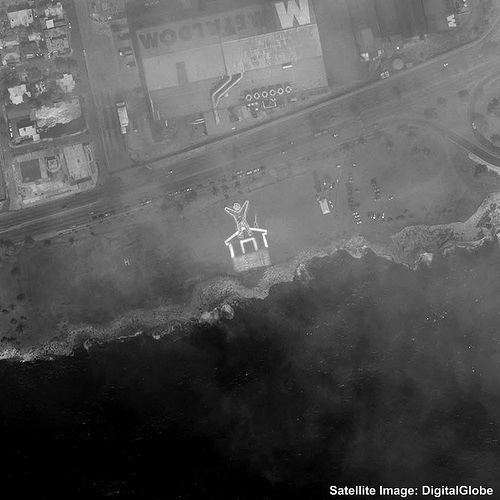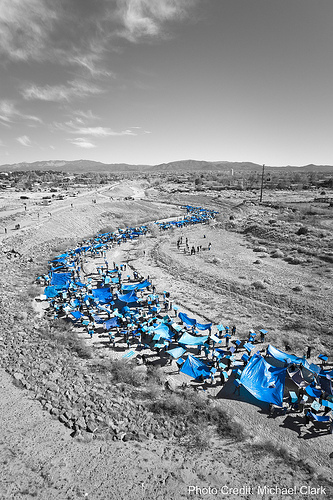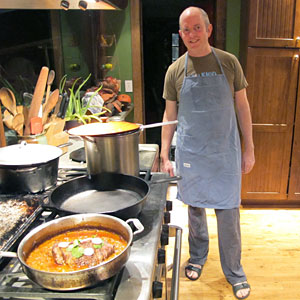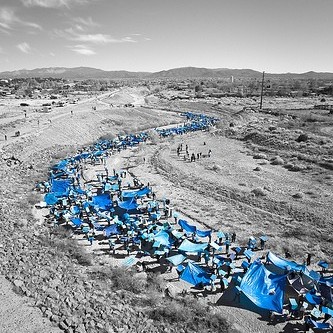Here’s a behind-the-scenes look at the biggest art project the planet has ever seen — so big that in some places we needed to back up into outer space for enough perspective. These pictures are the product of tens of thousands of people, some of whom have been working hard for six months, and they’re the product of a kind of faith. No one knew what they would look like because no one had ever done anything quite like them before.
But everyone who’s seen them this past week has gasped — they’ve sensed, perhaps, the fundamental truth of the global-warming era, which is that we live on a planet. A ball of rock with a thin atmosphere that we’re completely capable of messing up.
 Photo: Flickr via 350.orgTake this image from the Dominican Republic, of a person on a house trying to escape the rising water. My fantasy is that we weren’t the only ones watching, that some distant alien was looking on as well, and he was able to report to his superiors, “I think they’re starting to get it.”
Photo: Flickr via 350.orgTake this image from the Dominican Republic, of a person on a house trying to escape the rising water. My fantasy is that we weren’t the only ones watching, that some distant alien was looking on as well, and he was able to report to his superiors, “I think they’re starting to get it.”
But the distant images weren’t the only ones that took my breath away. It was just as sweet to see the close-ups of Indian school kids making a giant elephant, or South African boys tending the solar cookers that formed the core of the giant sun, or the Harlem crew painting a rooftop with reflective paint.
In fact, it is the mashup that makes this art so special — the mashup of professional artists and eager volunteers, the mashup of dire warning and hopeful prophecy, and the mashup of the highest and lowest tech. To paint a sheet of cardboard blue and join thousands of others to hold it overhead to turn a dry gulch into a raging river — well, you might have been able to pull that off a hundred years ago. And maybe you could have gotten the helicopter overhead 50 years ago. And the folks at DigitalGlobe have been able to take these nifty satellite pictures for a few years. But it’s only in our present moment that you can watch something like this on YouTube.
 Photo: Flickr via 350.orgHere’s how David Abram, the author of the just-released and completely wonderful Becoming Animal, reported on the scene in Santa Fe, N.M., where the “Flash Flood” installation came to light:
Photo: Flickr via 350.orgHere’s how David Abram, the author of the just-released and completely wonderful Becoming Animal, reported on the scene in Santa Fe, N.M., where the “Flash Flood” installation came to light:
Wonderful music — local bands at different points along the meander, strong buffalo dancers (and singers and drummers) from a nearby pueblo lending a potent ritual edge to the whole thing, and all of us with our kids dancing, though these got drowned out by the thudding helicopter that hovered over head for the last 45 minutes — a different kind of drum. I especially enjoyed the ambiguous mongrel amalgam of down-home local commitment and creativity with big-technology savvy and precision — the eloquent weirdness of helicopters and even satellites lending themselves to something so simple and motley human-scale. This bodes well for the future.
It does bode well, I think. We’re going to need to build a movement, and movements grow by capturing imagination, which builds commitment and cohesion and eventually produces enough power to make change. We’re a long way from having the power to seriously challenge the fossil-fuel industry, but there are no shortcuts on the path. And so we need every tool we can find — art being one of the most powerful. Science too — that’s why there’s a 350 down in the corner of most of these pictures. There’s no conflict here — just the most important mashup of all, between the different sides of our brains, finally connecting to put the big picture in focus.



